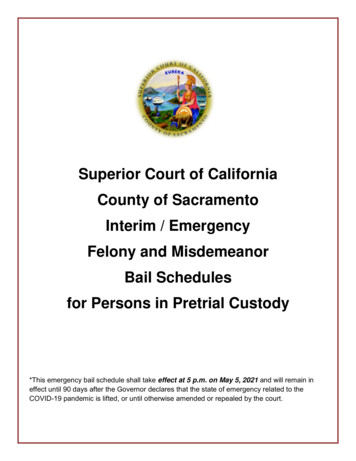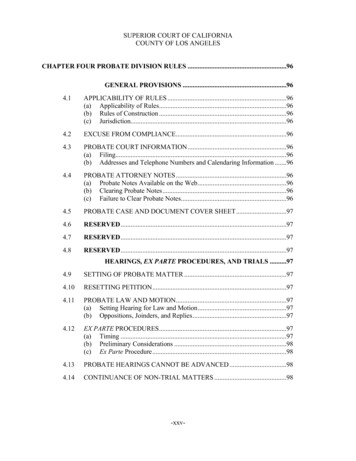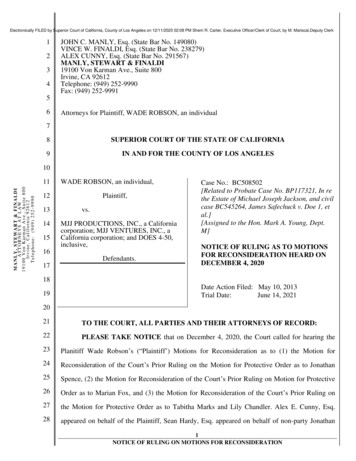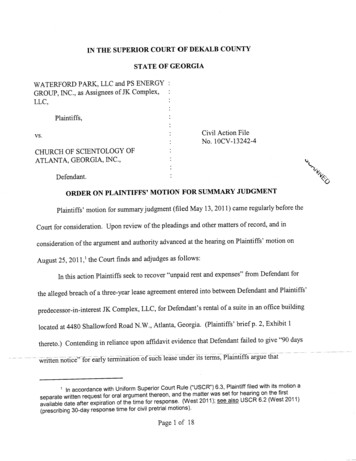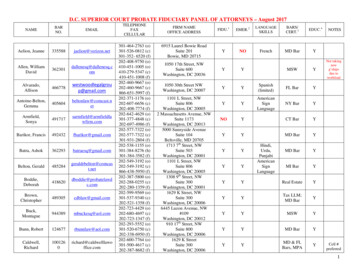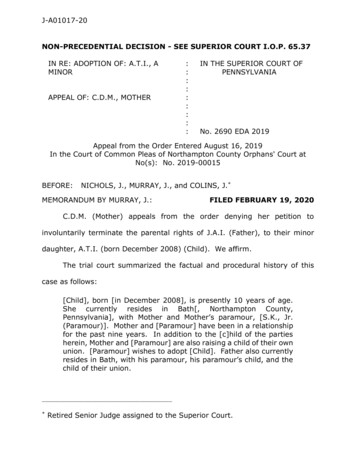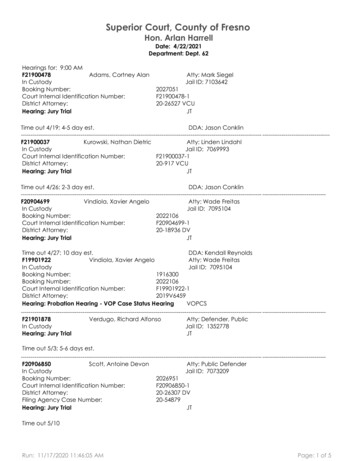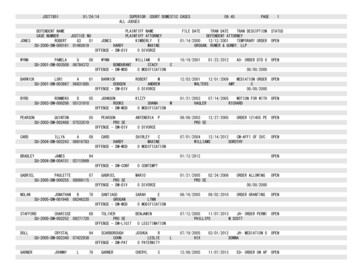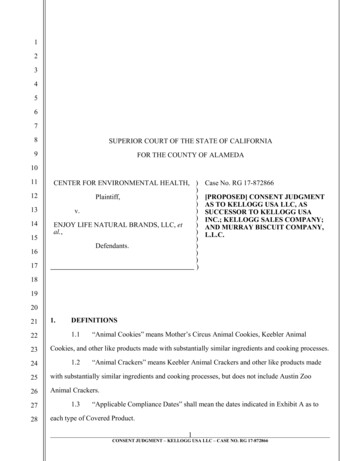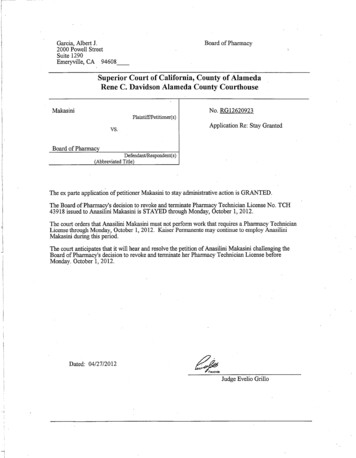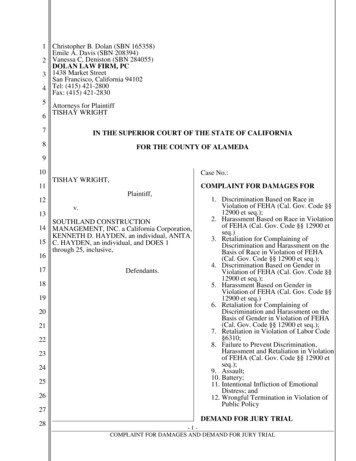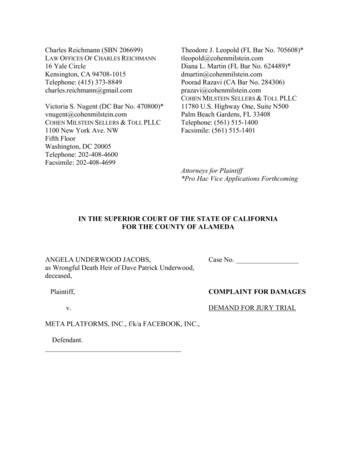
Transcription
Charles Reichmann (SBN 206699)LAW OFFICES OF CHARLES REICHMANN16 Yale CircleKensington, CA 94708-1015Telephone: (415) 373-8849charles.reichmann@gmail.comVictoria S. Nugent (DC Bar No. 470800)*vnugent@cohenmilstein.comCOHEN MILSTEIN SELLERS & TOLL PLLC1100 New York Ave. NWFifth FloorWashington, DC 20005Telephone: 202-408-4600Facsimile: 202-408-4699Theodore J. Leopold (FL Bar No. 705608)*tleopold@cohenmilstein.comDiana L. Martin (FL Bar No. 624489)*dmartin@cohenmilstein.comPoorad Razavi (CA Bar No. 284306)prazavi@cohenmilstein.comCOHEN MILSTEIN SELLERS & TOLL PLLC11780 U.S. Highway One, Suite N500Palm Beach Gardens, FL 33408Telephone: (561) 515-1400Facsimile: (561) 515-1401Attorneys for Plaintiff*Pro Hac Vice Applications ForthcomingIN THE SUPERIOR COURT OF THE STATE OF CALIFORNIAFOR THE COUNTY OF ALAMEDAANGELA UNDERWOOD JACOBS,as Wrongful Death Heir of Dave Patrick Underwood,deceased,Plaintiff,v.META PLATFORMS, INC., f/k/a FACEBOOK, INC.,Defendant.Case No.COMPLAINT FOR DAMAGESDEMAND FOR JURY TRIAL
TABLE OF CONTENTSPARTIES . 3JURISDICTION AND VENUE . 3FACTUAL ALLEGATIONS . 4I.The Murder of Officer Underwood. 4II.Meta Connected Officer Underwood’s Murderer and His Accomplice -and Helped Build the On-Line Boogaloo Community that Supported TheirCriminal Planning . 5III.Meta Played An Active Role in the Events that Led to Dave PatrickUnderwood’s Death . 8A.Meta’s Revenues Are Dependent on Ad Sales, Which AreDependent on a Robust User Base . 9B.Meta Promotes and Creates Inflammatory Content to Keep ItsUsers Engaged . 13C.Meta Promotes Participation in Extremist Groups to Keep Its UsersEngaged. 15D.Meta Knows That Its Business Model Has Contributed to PoliticalDestabilization and Violence In the United States and Abroad . 19COUNT ONE WRONGFUL DEATH DUE TO GENERAL NEGLIGENCE . 26COUNT TWO WRONGFUL DEATH DUE TO NEGLIGENT DESIGN. 28JURY TRIAL DEMAND . 312
Plaintiff Angela Underwood Jacobs, as Wrongful Death Heir of Dave Patrick Underwood,deceased, and his prospective successor-in-interest, by and through undersigned counsel, herebysues Meta Platforms, Inc., formerly known as Facebook, Inc., for the wrongful death of DavePatrick Underwood, and alleges as follows:PARTIES1.Plaintiff Angela Underwood Jacobs is a citizen of California, residing in LosAngeles County, and is otherwise sui juris.2.Defendant Meta Platforms, Inc., is a Fortune 500 company that operates socialmedia services, including the www.facebook.com website and Facebook applications for mobiledevices. Prior to October 2021, Meta Platforms, Inc., was known as Facebook, Inc. In thisComplaint, Plaintiff refers to the Defendant as “Meta,” including, for the sake of consistency,with regard to the actions and conduct of the company prior to its name change, and refers toMeta’s social media services consisting of its website and mobile applications as “Facebook.”3.Meta is incorporated in Delaware, and its principal place of business is 1 HackerWay, Menlo Park, CA 94025, in San Mateo County.JURISDICTION AND VENUE4.This is a survival action for the extreme pain and suffering endured by DavePatrick Underwood from the time of the shooting until the time of his death, and an action for hiswrongful death, seeking damages in excess of 25,000, exclusive of attorneys’ fees and costs.5.Plaintiff Angela Underwood Jacobs brings these claims pursuant to CaliforniaCode of Civil Procedure § 377.60, as a wrongful death heir of Dave Patrick Underwood,deceased, and his prospective successor in interest under California Code of Civil Procedure§ 377.30.3
6.At the time of his death, Dave Patrick Underwood was a citizen and resident ofCalifornia and without a “surviving spouse, domestic partner, children . . . issue of deceasedchildren,” Cal. Code Civ. P. § 377.60(a), or surviving parents.7.Plaintiff Angela Underwood Jacobs, as a surviving sibling of Dave PatrickUnderwood, would be entitled to the property of Dave Patrick Underwood under the Californialaws of intestate succession, see Cal. Prob. Code § 6402(c), and, therefore, has standing to bringa claim for his wrongful death under California Code of Civil Procedure § 377.60(a). Plaintiffalso brings this action as the prospective successor in interest to Dave Patrick Underwood’ssurvival claim because the administration of his Estate is ongoing and may well not be resolvedprior to the running of the statute of limitations on that claim.8.Defendant Meta is subject to the jurisdiction of this Court because it isheadquartered in California. Furthermore, Meta is qualified and authorized to, has regularlydone, and is doing business in California, and has systematically conducted business on a regularbasis in California, under and by virtue of California law.9.Venue is proper in Alameda County, where Dave Patrick Underwood’s wrongfuldeath occurred, under California Civil Code of Procedure 395.FACTUAL ALLEGATIONSI.10.The Murder of Officer UnderwoodDave Patrick Underwood was a Federal Protective Services Officer workingunder a contract with the Department of Homeland Security to provide security services at theRonald V. Dellums Federal Building and United States Courthouse in Oakland, California.11.On May 29, 2020, Officer Underwood was stationed in a guard post outside theFederal Building and Courthouse during protests over the police killing of George Floyd.4
12.While on duty, Officer Underwood was the victim of a drive-by shooting, whichtook his life at the age of 53. He suffered bullet wounds to the neck and right flank. OfficerUnderwood did not die immediately after he was shot. He remained alive at the scene of theshooting while waiting for paramedics, and was alive in the ambulance while being transportedto the hospital. Officer Underwood died some time later while in the emergency room atHighland Hospital. Wounds of this nature cause extreme pain and suffering.13.The shooting was not a random act of violence. It was the culmination of anextremist plot hatched and planned on Facebook by two men who Meta connected throughFacebook’s groups infrastructure and its use of algorithms designed and intended to increase userengagement and, correspondingly, Meta’s profits.II.14.Meta Connected Officer Underwood’s Murderer and His Accomplice -- andHelped Build the On-Line Boogaloo Community that Supported TheirCriminal PlanningAmong the extremist political movements that have grown in force over the lastdecade is a new strand of anti-government, anti-authoritarian agitation referred to as“boogaloo.”1 While no definitive ideology or platform unites this movement, the core interestsshared by boogaloo adherents are a fervent opposition to governmental authority and the idea ofgovernment itself and enthusiastic planning for a future civil war. The boogaloo communityincludes white supremacists, militia promoters, and far-right conspiracy theorists – but theirviews are not universally held.15.The term “boogaloo” first appeared in 2018 as a slang reference to future civilwar. A movement cohered around the term in 2019. A proliferation of boogaloo groups exploded1Katie Shepherd, An Officer was Gunned Down. The Killer was a ‘boogaloo boy’ usingNearby Peaceful Protests as Cover, Feds say, THE WASHINGTON POST (June 17, 2020).5
on Facebook in the early months of 2020 in response to governmental efforts to manage thecoronavirus pandemic. These Facebook groups openly advocated for violence, discussed tacticalstrategies, combat medicine, and the merits of specific weapons, and shared information aboutbuilding explosive devices.216.At approximately 7:20 on the morning of May 28, 2020, Steven Carrillo, an activesergeant in the United States Air Force assigned to the Travis Air Force base in Fairfield,California, posted a YouTube video on a Facebook boogaloo group page showing a large crowdviolently attack two California Highway Patrol vehicles. Upon information and belief, this groupwas part of the “BoojieBastards” network of Facebook groups, which included groups calledBoojieBastards: The Armory, BoojieBastards: Intelligence and Surveillance, and the off-shoot/K/alifornia Komando. Carrillo exhorted one of his Facebook groups: “It’s on our coast now, thisneeds to be nationwide. It’s a great opportunity to target the specialty soup bois. Keep thatenergy going.”317.“Soup bois” is a term that followers of the boogaloo movement use to refer to lawenforcement agents. “Bois” is an alternative spelling for “boys.” “Soup” is short for “alphabetsoup,” which is a reference to law enforcement agencies that are commonly referred to byacronyms (e.g., FBI, DOH). “Specialty soup bois” more specifically references federal lawenforcement agents.2Extremists Are Using Facebook to Organize for Civil War Amid Coronavirus, TECHTRANSPARENCY PROJECT (Apr. 22, 2020), -war-amid-coronavirus.3Criminal Complaint, USA v. Carrillo, No. 4:20-cr-00265-YGR (N.D. Cal. June 16,2020), at ¶ 51.6
18.At approximately 7:37 AM, Robert Alvin Justus, Jr., a resident of Millbrae,California, agreed with Carrillo by responding to his post: “Lets [sic] boogie.”419.On May 29, 2020, at 7:57 AM, Carrillo posted again to his Facebook group: “If itkicks off? Its [sic] kicking off now and if its [sic] not kicking off in your hood then start it. Showthem the targets.”520.Carrillo posted again at 8:02 AM, referring to the protests over the police killingof George Floyd: “ Go to the riots and support our own cause. Show them the real targets. Usetheir anger to fuel our fire. Think outside the box. We have mobs of angry people to use to ouradvantage.”621.Carrillo and Justus agreed to meet on May 29 and drive together to the Oaklandprotests.7 Carrillo, driving a white van, picked Justus up at the San Leandro BART station. Justusthen drove the van to Oakland and eventually drove past the guard post manned by OfficerUnderwood, at which point Carrillo fired multiple rounds with a homemade assault rifle throughthe open passenger-side sliding door.22.Carrillo was arrested after committing crimes subsequent to the murder of OfficerUnderwood and was found to have used his blood to write the following words and phrases:“BOOG,” “I became unreasonable,” and “stop the duopoly.” These words and phrases havesignificance to the boogaloo movement.823.Upon information and belief, prior to meeting on May 29, 2020, Carrillo andJustus had never met in person. Their paths had no reason to cross outside of Facebook.4Id.Id. at ¶ 52.6Id.7Id. at ¶ 45.8Id. at ¶ 36.57
24.Steven Carrillo, born in Los Angeles in 1988, was an active duty military policeofficer – a staff sergeant assigned to the 60th Security Forces Squadron out of Travis Air ForceBase – at the time of Officer Underwood’s murder. Carrillo entered the Air Force in February2009 after completing basic training and security force training at Lackland Air Force Base inTexas and he worked as a recruiter in Brentwood, California. In 2018, he was assigned to theTravis Air Force Base, which is located approximately 90 minutes northeast of Oakland,California.25.Robert Alvin Justus, Jr., born in 1989, has no history of military service. Uponinformation and belief, Justus did not receive a high school diploma, but received vocationaltraining and holds a locksmith’s license. At the time of Officer Underwood’s murder, he wasliving in Millbrae, California, approximately 30 minutes southwest of Oakland, California. Uponinformation and belief, Justus explored fathers’ rights and Second Amendment rights onFacebook. Meta led Justus down a road toward extremism, recommending, among other things,that he join boogaloo-related groups, including the group that introduced him to Carrillo, wheremembers conspired to commit acts of violence against federal law enforcement officers underthe cover of the protests taking place in response to the police killing of George Floyd.26.Carrillo and Justus only knew each other via Facebook. Upon information andbelief, Plaintiff alleges that Carrillo and Justus only met on Facebook because Metarecommended that Justus join groups dedicated to promoting the boogaloo movement.III.Meta Played An Active Role in the Events that Led to Dave PatrickUnderwood’s Death27.Meta’s business model is based on its ability to attract two groups to the platform– users and advertisers. Meta has created a variety of proprietary products – including Facebook8
user dossiers, Facebook customized recommendations, and Facebook group space – to ensurethat it engages users and captures information about them for the benefit of advertisers.A.28.Meta’s Revenues Are Dependent on Ad Sales, Which Are Dependenton a Robust User BaseFacebook is the largest social media network in the world. What began as a wayfor Harvard students to meet and socialize is now an open platform used by billions of peoplearound the world. At the end of 2019, Facebook had 2.50 billion monthly active users, of whichapproximately 1.66 billion used the site every day. But Facebook’s users are not using the socialmedia network merely to socialize—many are coming to Facebook for news instead of obtainingthat information from traditional sources.29.Users do not pay Meta to create a Facebook account. Once a user opens aFacebook account, the account holder can, at no cost, create a profile page, post content (such asphotographs, videos, and links to articles), make friends with other users, view content posted byother users, and join groups sponsored and supported by Facebook.30.Instead of charging account holders to access the platform, Meta earns most of itsrevenue by selling advertising services. For example, Meta generated 69.7 billion fromadvertising in 2019, more than 98% of its total revenue for the year. Meta is able to generatesuch revenues by marketing its user base to advertisers.31.Meta collects and analyzes data to assemble virtual dossiers on its users, coveringhundreds if not thousands of user-specific data segments. This data collection and analysisallows advertisers to micro-target advertising and advertising dollars to very specific types ofusers, who can be segregated into pools or lists using Facebook’s data segments. Only a fractionof these data segments come from content that is explicitly designated by users for publication orexplicitly provided by users in their account profiles. The majority of these data segments are9
collected by Meta through surveillance of each user’s activity on the platform and off theplatform, including behavioral surveillance that users are not even aware of like navigationpaths, watch time, and hover time.32.Notwithstanding this abundance of data, Meta does not always draw accurateconclusions about its users. A recent study from the Pew Research Center found that 27% ofFacebook users surveyed found that the interests and political classifications assigned to them byFacebook were not very accurate or not at all accurate.33.Facebook, as originally conceived, may have functioned like an enormous virtualbulletin board, where content was published by authors. But Facebook has evolved over timewith the addition of numerous features and products designed by Meta to engage users. Theearliest of these – the search function and the “like” button – were user-controlled features. Inmore recent years, however, Meta has taken an active role in shaping the user-experience on theplatform with more complex features and products that are not triggered by user requests.9 Themost visible of these are curated recommendations, which are pushed to each user in a steadystream as the user navigates the website and in notifications sent to the user’s smartphone andemail addresses when the user is off-platform. These proprietary Facebook products10 includeNews Feed (a newsfeed of stories and posts published on the platform, some of which are postedby your Facebook friends or members of groups you have joined, and others that are suggestedfor you by Facebook), People You May Know (introductions to persons with common9Luke Munn, Angry by design: toxic communication and technical architectures,HUMAN. SOC. SCI. COMM. 7, 53 (2020).10Facebook refers to “features” and “services” provided on the Facebook platform as“Facebook Products” in its Terms of Service. The Facebook Terms of Service also grantsFacebook a license to “host, use, distribute, modify, run, copy, publicly perform or display,translate, and create derivative works of” content created by Facebook users. Terms of Service,FACEBOOK, https://www.facebook.com/terms.php?ref pf (last visited Oct. 15, 2021), at ¶ 3.10
connections or background), and Suggested for You, Groups You Should Join, and Discover(recommendations for Facebook groups to join).34.These curated and bundled recommendations are developed throughsophisticated algorithms. As distinguished from the earliest search functions that were used tonavigate websites during the Internet’s infancy, Meta’s algorithms are not based exclusively onuser requests or even user inputs. Meta’s algorithms combine the user’s profile (e.g., theinformation posted by the user on the platform) and the user’s dossier (the data collected andsynthesized by Meta to which Meta assigns categorical designations), make assumptions aboutthat user’s interests and preferences, make predictions about what else might appeal to the user,and then make very specific recommendations of posts and pages to view and groups to visit andjoin based on rankings that will optimize Meta’s key performance indicators.35.Meta’s algorithms are carefully protected intellectual property. While they areoften characterized as automated and impersonal, they are, in actuality, dynamic and subject tofrequent refinement. They also reflect the inferences, judgments, priorities, and decision-makingof human programmers, managers, and executives at Meta. Importantly, they are also optimizedto achieve Meta’s chief goal: increasing the time users spend on the platform.36.Meta has found that users engage more with the site when Facebook shows themcontent likely to get them to share and react, namely content that will outrage or titillate theuser.1111Karen Hao, How Facebook got Addicted to Spreading Misinformation, MITTECHNOLOGY REVIEW (Mar. 11, 2021).11
37.Meta CEO Mark Zuckerberg publicly recognized this in a 2018 post, in which hedemonstrated the correlation between engagement and sensational content that is so extreme itviolates Facebook standards, with the following chart:1238.While CEO Zuckerberg asserted, at that time, that Facebook user engagement hadstayed within the boundaries of content deemed acceptable by Meta, the public record has shownFacebook content on the wrong side of public safety and public health: disruption of Black LivesMatter protests by white supremacists, the boogaloo movement, coronavirus disinformation andrelated anti-mask agitation. Meta has been most recently on the wrong side of efforts todestabilize the democratic process, by boosting content that attempted to de-legitimize the 2020election and fomenting the Capitol Riot.39.Meta’s algorithms create a self-reinforcing and accelerating dynamic. Byelevating and promoting inflammatory, divisive, and untrue content, Meta encourages thepublication of such content. At the same time, Meta’s algorithms learn to feed users increasinglyextreme viewpoints because users engage more with such content.13 These effects are not12Mark Zuckerberg, A Blueprint for Content Governance and Enforcement, 72082/ (last visited October 15, 2021).13Hao, supra note 11.12
unintentional. Meta’s first Director of Monetization, Tim Kendall, has explained that Meta has“sought to mine as much attention as humanly possible. [taking] a page form Big Tobacco'splaybook, working to make [its] offering addictive at the outset.”14B.40.Meta Promotes and Creates Inflammatory Content to Keep Its UsersEngagedMeta’s algorithms promote extremism by exposing users to inflammatory,divisive, and untrue content. Meta has elected to do this because material that engenders a strongemotional reaction engages readers.1541.Meta’s algorithms reward the most prolific users, recommending their content,even though hyperactive use is associated with partisan accounts and suspicious use patternssuggestive of shift-work or bot activity. Facebook accounts that are known for and promotemisinformation generate almost twice as much engagement per follower than other accounts.16As such Meta’s policy to promote the most engaging content promotes accounts that pushmisinformation.42.The News Feed product is a customized scroll that Facebook creates for eachuser, recommending news stories and posts. The contents of each user’s scroll vary depending onMeta’s dossier and the weight Meta’s algorithms place on the user’s profile and the people,groups, and stories that are trending. The News Feed accounts for the majority of time that usersspend on the platform.14Kate Cox, Former Facebook manager: “We took a page from Big Tobacco’splaybook,” ARS TECHNICA (Sept. 24, 2020).15Jeff Horwitz, Facebook Executives Shut Down Efforts to Make the Site Less Divisive,THE WALL STREET JOURNAL (May 26, 2020); Munn, supra note 9.16Far-Right Misinformation Is Thriving on Facebook. A New Study Shows Just HowMuch, NPR (Mar. 6, 2021), -shows-just-how-much.13
43.A major overhaul of the News Feed algorithm in 2018 was intended, according toMeta, to boost “meaningful social interactions.”17 Instead, staffers realized, it was making theplatform an angrier place. As explained by one internal memo, the decision to give greaterweight to the number of comments and reshares “had unhealthy side effects on important slicesof public content, such as politics and news” because content publishers were re-orienting theirposts toward outrage and sensationalism to increase the likelihood of wider visibility andreview.18 Staffers noted that “[m]isinformation, toxicity, and violent content are inordinatelyprevalent among reshares.”1944.Meta researchers also took note in 2018 that the MSI (meaningful socialinteractions) project, by rewarding untrue, divisive, and violent content, was discouraging theposting of truly meaningful content, thereby reducing the opportunities for user engagement with“positive and policy posts.” 2045.Internal company documents show that Meta tests in 2019 again showed thatMeta’s algorithms were delivering News Feeds comprised of divisive and extremist content aswell as misinformation and that by simply following those recommended pages and groups,ordinary users would encounter a “nightmare” of “polarizing nationalist content, misinformation,and violence and gore.”21 In the words of one Meta researcher, “I’ve seen more images of deadpeople in the past 3 weeks than I’ve seen in my entire life.”2217Keach Hagey, Facebook Tried to make its Platform a Healthier Place. It Got AngrierInstead., THE WALL STREET JOURNAL (Sept. 15, 2021).18Id.19Id.20Id.21Justin Scheck, Facebook Employees Flag Drug Cartels and Human Traffickers. TheCompany’s Response is Weak, Documents Show., THE WALL STREET JOURNAL (Sept. 16, 2021).22Id.14
46.In the spring of 2020, Meta tested a revision of an algorithm called “downstreamMSI” and found that reducing the weight assigned to the likelihood that people would share orcomment on a post would reduce the proliferation of false content.23 Meta applied this revisionto civic and health information in the spring of 2020, but CEO Mark Zuckerberg advised his staffthat he did not want to apply the changes to other types of content if it would reduce userengagement.24C.47.Meta Promotes Participation in Extremist Groups to Keep Its UsersEngagedSince 2017, Meta has focused its efforts on boosting membership in groups. Metahas stated a goal of enrolling 1 billion of its users in meaningful groups. In February 2017, 100million were subscribed to groups; by February 2019 that number had grown to 400 million.48.Meta’s business strategy is sound. It is well-established in the social, behavioral,and health sciences that a sense of belonging improves health and emotional well-being. Indeed,belonging has been identified as a basic human need and a motivating driver of human behavior.49.Meta’s efforts to promote groups are both categorical and specific. Metaadvertises groups – writ large – on the platform and spent 10 million to air a 60-second adpromoting Facebook groups during Super Bowl LIV.25 Meta has re-tooled its mobileapplications and website to move groups and group recommendations into positions ofincreasing prominence. During 2019 and 2020, Meta rolled-out a major re-design of the mobileapplication and website interfaces to achieve this goal.23Hagey, supra note 17.Id.25Salvador Rodriguez, Mark Zuckerberg shifted Facebook’s focus to groups after the2016 election and it’s changed how people use the site, CNBC (Feb. 16, ent.html1524
50.In addition to the spending and opportunity costs Meta has devoted to this explicitmarketing, Meta invested in supporting the infrastructure of groups, developing tools and supportservices for the administrators and moderators of Facebook groups. At present, there areapproximately 70 million such administrators.51.Facebook promotes specific groups to individual users, showing them content inin users’ timelines, through their News Feeds, and through specific recommendations to joingroups via Suggested For You, Groups You Should Join, and Discover. As explained above,these recommendations are generated by Facebook algorithms which are built more upon Meta’sassumptions and inferences about what users think, like, and want rather than what users haveexplicitly written, liked, or indicated to Facebook. The algorithms are weighted to favor untrue,inflammatory, and divisive content that will grab and keep users’ attention. Furthermore, therecommendations are not based on Facebook user requests for recommendations – they arepushed onto users. Plaintiff alleges that Meta is recruiting new members for extremist groups.52.While Meta recruits members for Facebook groups, Meta does not employcontent moderators to monitor the content generated by private groups. Meta relies on artificialintelligence to monitor content generated by these groups and there is evidence that thesesystems, as designed, may catch only 3-5% of hate content.26 By failing to adequately employthe use of artificial intelligence to eliminate hate content, Meta largely relies on group membersto report violations of Facebook’s Terms of Service and other policies and to monitor their owncontent within the group. Groups can designate some of the group members as administrators ormoderators, but these are regular Facebook users – not employees of the company – who have26Testimony of Frances Haugen before the United States Senate on October 5, 2021.16
discretion to block content. Some moderators of extremist groups have warned that anyonereporting content to Facebook will be removed from the group.53.Nor does Meta issue warnings to users about groups. While the Terms of Servicedisclaims any responsibility for what Facebook users do or say, on or off the platform, anddisclaims any responsibility for Facebook user actions on or off the platform, Meta does notadvise users of the specific actions Meta has taken to: adhere users to the platform withinflammatory, divisive, and untrue content; to place users in extremist groups, and; to send userscontent that reinforces the world views expressed in those extremist groups.54.Meta’s failure to warn users about the insidious effects and real-world harmscaused by its decision to promote extremist groups and develop inflammatory content isinexcusable considering what Meta’s own research shows about how Meta’s algorithms work.Meta’s recommendations can turn a visit to a recommended group into an echo chamber. Once auser has visited a page, Facebook will recommend related pages. The cumulative effect of manyrecommendations is greater than the sum of these individual recommendations. Numerouscommentators have observed that in the universe of boogaloo disciples, white supremacists, andhomegrown militias, a flood of violent and incendiary content quickly radicalizes newmembers.27 The inductee is essentially immersed in a universe of people, ideas, and events –recommended by Facebook.55.Meta knew or should have known that in addition to the social and personalbenefits associated with a sense of belonging, there are negative consequences of groupformation, too. “[T]he radicalizing effects of various group dynamics have been thoroughly27Judd Legum, Murder exposes Facebook’s Boogaloo Problem, POPULAR INFORMATION(June 18, 2020), http
IN THE SUPERIOR COURT OF THE STATE OF CALIFORNIA FOR THE COUNTY OF ALAMEDA ANGELA UNDERWOOD JACOBS, as Wrongful Death Heir of Dave Patrick Underwood, deceased, Plaintiff, v. META PLATFORMS, INC., f/k/a FACEBOOK, INC., Defendant. _ C
